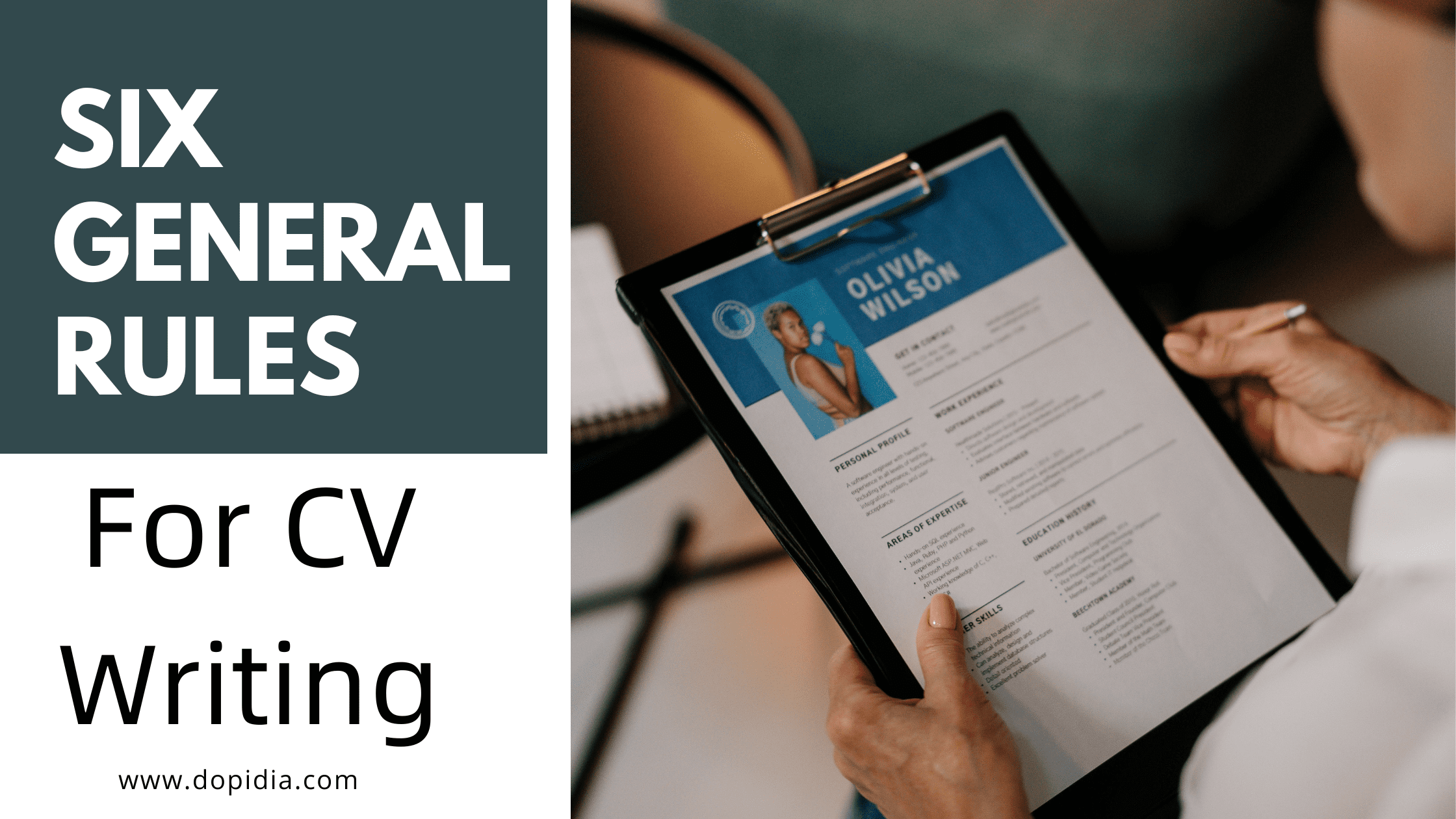6 General Rules For CV Writing
For busy hiring managers, your resume is a summary of your career and often what determines whether you get an interview. If the job search is a journey, a brilliant CV is your passport.
The basic principles of CV writing have remained the same for generations, but technological advances mean that more parts of the application and recruitment processes are happening online than ever before. If you stay up to date on best practices, you’ll also be able to design a resume that works for you.
In this article, we discuss six general rules that you can keep in mind when creating or updating your resume.
- Include all basic information
- Get inspiration from other CVs
- Use as few words as possible
- If possible, quantify your achievements
- Use keywords that employers use in their job descriptions
- Proofread several times to detect typing and spelling errors.
How to write a CV
Note that you can use these rules in any format, but since different types of software will read your resume, a simple one-column format and a professional font are best.
1. Bring all the basic information
The goal of a CV is to best demonstrate your relevant skills and achievements, and there are a number of ways to achieve this. However, every CV must contain certain basic elements:
- Relevant education or certifications and/or licenses. How important your educational background is depends on the job or industry you are interested in. If you have many educational qualifications, it is enough to include those that are most relevant to the job description.
- Relevant work experience and experience as a volunteer. Most people choose to start with their last job when listing their experience. Don’t include everything you did at previous jobs. Focus on achievements rather than responsibilities.
- Contact information. Your full name, the city you live in, your email address and your phone number. Because this personal information is sensitive, you should be careful with whom you share your resume. Read these safe job search guidelines to protect yourself.
- Relevant skills and your level of knowledge. For example, “can converse in Spanish” or “experience with Microsoft Excel” compared to “fluent in Spanish” or “expert in Microsoft Excel”.
Note that the basic information in a CV does not usually include references. It is best not to include them on the CV. It saves space and protects the privacy of your professional contacts.
Related: 14 JOBS FOR YOUNG PEOPLE AND TIPS FOR HIGH SCHOOL STUDENTS
2. Get inspiration from other CVs
It can help to see how others have written about their skills and experience. This is a very good way to discover more effective ways to describe your credentials and avoid clichés.
You can also get a feel for the internal language used in a particular industry or company. You may have experience that is not directly related to the position you are applying for, but is still highly relevant, and you want to include it in your CV. Someone else’s resume may show a similar background and can provide an example of how to present your experience in a compelling way.
3. Use as few words as possible
Employers need to be able to quickly get a picture of your work experience. Structure your experience section as a list of short, easy-to-read bullet points rather than writing long paragraphs. For example:
Verbatim: Applied my expertise in budget management to achieve a 20% reduction in departmental spending through a thorough analysis where significant inefficiencies were identified.
More Concise: Reduced department expenses by 20% by eliminating inefficient work.
The typical CV is a maximum of two pages so be sure to include only the most important information. If you have difficulty deciding what is important, you can ask yourself if what you bring is relevant to what the employer is asking for in the job description.
It is also important to think about the type of job that you really want to be recruited for. In other words, don’t bring past experience with tasks you didn’t enjoy at all. Keep the experiences you want to continue to build on and match them with what the employer is looking for. This is the type of information you should include in your resume.
4. If possible, quantify your achievements
Numbers and data bring your experience to life and help hiring managers imagine what you could contribute to their organization. Back up your achievements with real-world data whenever possible to boost your credibility, and add informative details to your resume. For example:
Unquantified: Improved lead generation through strategic content marketing initiatives.
Quantified: Achieved 180% lead growth each year through strategic content marketing initiatives.
5. Use keywords that employers use in their job descriptions
Hiring managers want to see that you can speak their language and know the language commonly used in the industry. When they see their own keywords reflected in your resume, their belief that you are a strong candidate for the role increases. And if your CV is to be published in an online database such as Indeed CV, the right keywords are essential for you to be discovered by employers.
One way to get familiar with the different keywords is to experiment with different search terms on se.indeed.com or in the Indeed app . Read the job postings that interest you carefully and note the terms and phrases that employers use. You may begin to discover commonalities and may include some of these words or concepts in your resume if they are relevant to your background.
6. Proofread several times to detect typing and spelling errors
Unfortunately, sometimes a single typo or typo is all it takes to get your resume sorted out early in the process. Proofread your resume several times and make a careful edit line by line, word by word. By reading the content backwards, although it feels strange and time-consuming, you can spot small errors that you might have missed otherwise. It’s always a good idea to get an outsider’s perspective. Ask a friend, mentor, or family member to review your resume before you start sending it to employers.
A strong CV can streamline your job search process, help you showcase your strengths and get one step closer to your dream job. With some careful prep work, and by following these six rules, you can turn this basic job search document into one of your strongest professional assets.





What i do not realize is in fact how you are no longer actually much more wellfavored than you might be right now Youre very intelligent You recognize thus considerably in relation to this topic made me in my view believe it from numerous numerous angles Its like men and women are not fascinated until it is one thing to do with Lady gaga Your own stuffs excellent All the time handle it up